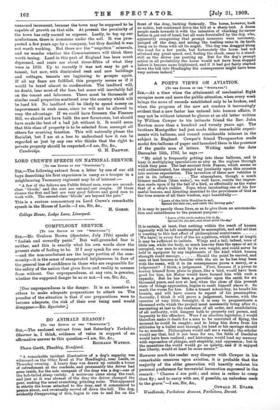A POET'S VIEWS ON AVIATION. [To THE EDITOR 01I THE
" sr e crATo IL.•
SIR,—At a time when the attainment of mechanical flight occupies more and more the public attention, when every week brings the news of records established only to be broken, and when the progress of the new art renders it increasingly evident that a new factor has entered into human affairs, it may not be without interest to glance at an old letter written by William Cowper to his intimate friend the Rev. John
Newton more than a hundred and twenty years ago. The brothers Montgolfier had just made their remarkable experi- ments with balloons, and roused considerable interest in the subject in England. Cowper's friend Throgmorton made model fire-balloons of paper and launched them in the presence of the gentle man of letters. Writing under the date December 15th, 1783, he says:— "My mind is frequently getting into these balloons, and is busy in multiplying speculations as airy as the regions through which they pass. The last account from France, which seems so well authenticated, has changed my jocularity upon this occasion into serious expectation. The invention of these new vehicles is yet in its infancy The atmosphere, though a much thinner medium [than water], we well know, resists the impres- sion made upon it by the tail of a bird, as effectually as the water that of a ship's rudder. Pope, when inculcating one of his few useful lessons, and directing mankind to the providence of God as the true source of all their wisdom, says beautifully :- ' Learn of the little Nautilus to sail,
Spread the thin oar, and catch the driving gale.'
It is easy to parody these lines, so as to give them an accommoda- tion and suitableness to the present purpose
Learn of the oirele•making kite to fiy,
Spread the fan-tail, and wheel about the sky.'
It is certain, at least, that nothing within the reach of human ingenuity will be left unattempted to accomplish, and add all that
is wanting to this last effort of philosophical contrivance [We have] in every fowl of the air a pattern, which now at length it may be sufficient to imitate. Wings and a tail, indeed, were of little use, while the body, so much heavier than the space of air it occupied, was sure to sink by its own weight, and could never be held in equipoise by any implements of the kind which human strength could manage Should the point be carried, and man at last become as familiar with the air as he has long been with the ocean, will it in its consequences prove a mercy, or a judgement ? I think, a judgement. First, because if a power to convey himself from place to place, like a bird, would have been good for him, his Maker would have formed him with such a capacity. But he has been a groveller 'upon the earth for six thousand years, and now at last, when the close of this present state of things approaches, begins to exalt himself above it. So much the worse for him. Like a truant school-boy, he breaks his bounds, and will have reason to repent of his presumption. Secondly, I think it will prove a judgement, because, with the exercise of very little foresight, it is easy to prognosticate a thousand evils which the project must necessarily bring after it ; amounting at last to the confusion of all order, and annihilation of all authority, with dangers both to property and person, and impunity to the offenders. Were I an absolute legislator, I would therefore make it death for a man to be convicted of flying, the moment he could be caught; and to bring him down from his altitudes by a bullet sent through his head or his carriage should be no murder. Philosophers would call me a vandal; the scholar would say that, had it not been for me, the fable of Daedalus would have been realised ; and historians would load my memory with reproaches of phlegm, and stupidity, and oppression; but in the meantime the world would go on quietly, and if it enjoyed less liberty, would at least be more secure."
However much the reader may disagree with Cowper in his remarkable censures upon aviation, it is probable that the majority of the older generation will heartily endorse his personal preference for terrestrial locomotion expressed in the remark : " Chactut a son goilt ; and mine is rather to creep
than fly ; and to early with me, if possible, an unbroken neck to the grave."—I am, Sir, &c.,
• OSWALD H. EVANS. Woodlands, Parlcslone Avenue, Parkstone, Dorset.






































 Previous page
Previous page